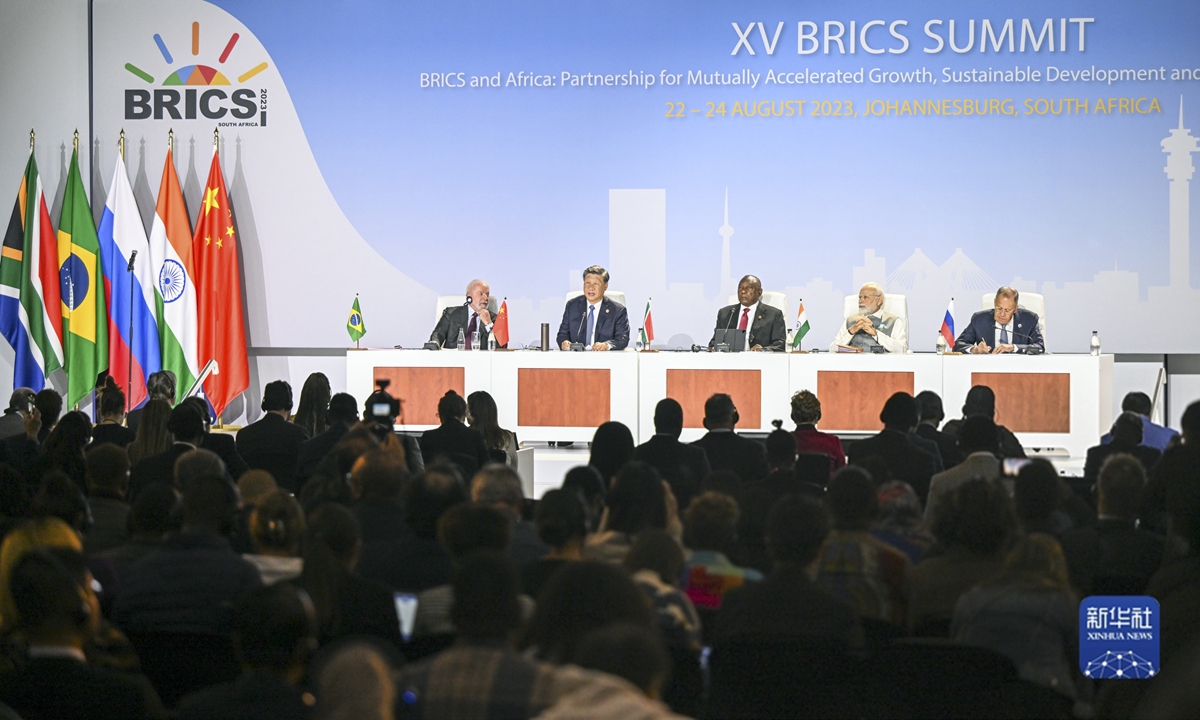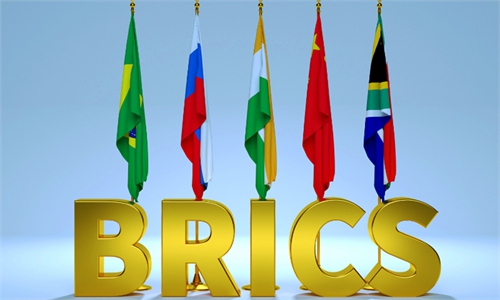
Chinese President Xi Jinping (second from left) delivers an important speech at a press conference during the 15th BRICS Summit in Johannesburg, South Africa, on August 24, 2023. BRICS leaders agreed on Thursday to invite six countries, namely Argentina, Egypt, Ethiopia, Iran, Saudi Arabia and the United Arab Emirates, to join the group. Photo: Xinhua
The 15th BRICS Summit, held in Johannesburg, South Africa, from Tuesday to Thursday, was a grand gathering of the Global South. More than 60 leaders and representatives of African countries and other emerging markets and developing countries attended the event. In a historic expansion, six countries - Argentina, Egypt, Ethiopia, Iran, Saudi Arabia and the United Arab Emirates - were invited to become new BRICS members, with their membership starting on January 1, 2024.
The expansion reflects the determination of the BRICS countries to unite and cooperate with other developing countries. It meets the expectations of the international community and serves the common interests of emerging market countries and developing countries. It also marks a new starting point for BRICS cooperation, injecting new vitality into the mechanism and further strengthening the power of world peace and development. This summit is not only a diplomatic victory for the BRICS countries but also a victory for China, as it has been actively promoting the expansion of the BRICS since the BRICS Summit in Xiamen. Now, BRICS has achieved its initial goal with regard to expansion.
During the BRICS Summit, Chinese President Xi Jinping held intensive multilateral and bilateral meetings and exchanges with leaders from various countries, including Indian Prime Minister Narendra Modi. According to a Chinese Foreign Ministry spokesperson, the two leaders had a candid and in-depth exchange of views on current China-India relations and other questions of shared interest. Xi stressed that improving China-India relations serves the common interests of the two countries and peoples, and is also conducive to peace, stability and development of the world and the region. The two sides should bear in mind the overall interests of their bilateral relations and properly handle the border issue so as to jointly safeguard peace and tranquility in the border region, Xi said.
This is another interaction following the Xi-Modi meeting during the G20 summit in Indonesia's Bali in November 2022, and is a mark of positive progress in China-India relations after the19th round of the China-India Corps Commander Level Meeting, held in August 13 and 14.
The border issue does not make up the entirety of China-India relations. China-India relations encompass many other aspects, including economic and trade relations, people-to-people exchanges, climate and development cooperation, multilateral cooperation such as in the Shanghai Cooperation Organisation and BRICS, regional peace and stability, and even global peace and stability.
To be frank, the severe standoff in the China-India border area in recent years is not China's responsibility. The border standoff between China and India is the result of India's "forward policy" implemented since the 1950s, the geopolitical competition between China and the US, among other reasons. China has no alternative but to carry out countermeasures. However, China has been rational and restrained, while India continuously connects the border issue with other issues, damaging the relationship between the two countries, and even obstructing China's initiatives in multilateral cooperation mechanisms such as the SCO and BRICS. However, the successful BRICS Summit in Johannesburg demonstrates that China's initiatives are widely welcomed by countries in the Global South. China is an important representative of the Global South, and is also inseparable from the upcoming G20 Summit in New Delhi.
Since Modi came to power, India has been moving increasingly closer to the US, Japan, and Australia, attempting to take advantage of the opportunity of strategic competition between China and the US to contain China and achieve its rise as a major power. India does not want to be a "pawn" in the US strategy of containing China, but the India-US non-allied alliance has become a destabilizing factor in the region and even the world, because India has been helping a tyrant to do evil. The US-led Western countries want to use India to divide the Global South and weaken China's position among developing countries in the Global South. Judging from India's diplomatic actions this year, it seems that it is enjoying this role. Hopefully, the BRICS Summit in Johannesburg will serve as a wake-up call for India.
The world has suffered enough from the US. The successful BRICS Summit in Johannesburg fully demonstrates that developing countries in the Global South hope to promote the establishment of a new global order, further reform the global financial system, and seek an independent and autonomous development path different from that of the US and the West. On this issue, China and India share common interests with other developing countries. If India also hopes to host a successful G20 Summit and truly speak up for the Global South, China's support is indispensable.
The author is secretary-general of the Research Center for China-South Asia Cooperation at Shanghai Institutes for International Studies, a visiting fellow of the Chongyang Institute for Financial Studies, Renmin University of China, and a distinguished fellow of the China (Kunming) South Asia & Southeast Asia Institute. opinion@globaltimes.com.cn

